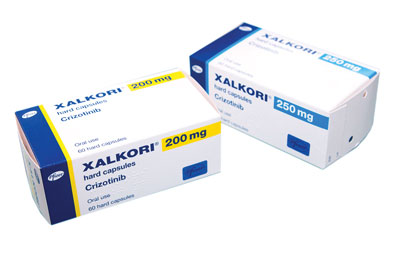Xalkori (crizotinib) vs Columvi (glofitamab-gxbm)
Xalkori (crizotinib) vs Columvi (glofitamab-gxbm)
Xalkori (crizotinib) is a targeted therapy known as an ALK inhibitor, primarily used to treat non-small cell lung cancer (NSCLC) with specific genetic alterations, such as ALK or ROS1 gene rearrangements. Columvi (glofitamab-gxbm), on the other hand, is a bispecific antibody designed for the treatment of certain types of B-cell non-Hodgkin lymphoma (NHL), targeting CD20 on B cells and CD3 on T cells to recruit the body's immune system to attack cancer cells. When deciding between these medications, it is crucial to consider the specific type and genetic profile of the cancer, as Xalkori is not indicated for NHL, and Columvi is not used for NSCLC; therefore, the choice of medicine would be guided by the cancer diagnosis and molecular testing results.
Difference between Xalkori and Columvi
| Metric | Xalkori (crizotinib) | Columvi (glofitamab-gxbm) |
|---|---|---|
| Generic name | Crizotinib | Glofitamab-gxbm |
| Indications | Non-small cell lung cancer (NSCLC), ALK or ROS1-positive metastatic NSCLC | Under investigation for B-cell non-Hodgkin lymphoma |
| Mechanism of action | ALK and ROS1 tyrosine kinase inhibitor | Bispecific CD20-directed cytolytic antibody |
| Brand names | Xalkori | Columvi |
| Administrative route | Oral | Intravenous |
| Side effects | Visual disorders, gastrointestinal effects, edema, elevated liver enzymes, etc. | Currently under investigation; specific side effects not yet fully characterized |
| Contraindications | Hepatic impairment, concurrent use of strong CYP3A inhibitors or inducers | Not yet fully established |
| Drug class | Tyrosine kinase inhibitor | Monoclonal antibody |
| Manufacturer | Pfizer | Genentech |
Efficacy
Xalkori (Crizotinib) Efficacy in Lymphoma
Xalkori (crizotinib) is primarily known as a treatment for non-small cell lung cancer (NSCLC) with specific genetic alterations, namely ALK or ROS1 rearrangements. However, its efficacy in lymphoma, particularly ALK-positive anaplastic large cell lymphoma (ALCL), has been a subject of clinical interest. ALK-positive ALCL is a subtype of non-Hodgkin lymphoma where the cells have an abnormality involving the ALK gene. Crizotinib, being an ALK inhibitor, has shown promise in treating this type of lymphoma. Clinical studies have demonstrated that crizotinib can induce responses in patients with relapsed or refractory ALK-positive ALCL, suggesting its potential utility as a targeted therapy for this condition.
Columvi (Glofitamab-gxbm) Efficacy in Lymphoma
Columvi (glofitamab-gxbm) is an investigational bispecific antibody designed to bind to both CD20 on B-cells and CD3 on T-cells, thereby redirecting T-cells to engage and eliminate B-cell lymphoma cells. While clinical trials are ongoing to fully establish its efficacy and safety profile, preliminary data from studies suggest that glofitamab may have therapeutic potential in the treatment of various B-cell lymphomas. Early-phase clinical trials have shown that glofitamab can induce complete and partial responses in patients with relapsed or refractory non-Hodgkin lymphoma, including those who have previously received multiple lines of therapy.
Comparative Efficacy in Lymphoma
When comparing the efficacy of Xalkori (crizotinib) and Columvi (glofitamab-gxbm) in lymphoma, it is important to consider the specific subtype of lymphoma and the genetic or molecular characteristics of the disease. Crizotinib is specifically effective in ALK-positive ALCL, a distinct subset of lymphoma, whereas glofitamab targets CD20-positive B-cell lymphomas more broadly. The efficacy of these agents in lymphoma is therefore not directly comparable, as they are used in different contexts and target different mechanisms of disease.
Conclusion on Efficacy
In conclusion, both Xalkori (crizotinib) and Columvi (glofitamab-gxbm) have shown efficacy in the treatment of certain types of lymphoma, albeit in different subtypes and through different mechanisms of action. Crizotinib has been effective in ALK-positive ALCL, while glofitamab is being investigated for its efficacy in B-cell lymphomas and has shown promise in early clinical trials. The continued development and clinical investigation of these agents will further define their roles in the treatment of lymphoma and potentially improve outcomes for patients with these malignancies.
Regulatory Agency Approvals
Xalkori
-
European Medical Agency (EMA), European Union

-
Food and Drug Administration (FDA), USA

-
Health Canada

-
Pharmaceuticals and Medical Devices Agency (PMDA), Japan

-
Therapeutic Goods Administration (TGA), Australia

Columvi
-
European Medical Agency (EMA), European Union

-
Food and Drug Administration (FDA), USA

Access Xalkori or Columvi today
If Xalkori or Columvi are not approved or available in your country (e.g. due to supply issues), you can access them via Everyone.org.
How it works

Make an enquiry
Choose the medicine you want to buy, answer a couple of questions, and upload your prescription to speed things up. We’ll get back to you within 24 hours.


Make an enquiry
Choose the medicine you want to buy, answer a couple of questions, and upload your prescription to speed things up. We’ll get back to you within 24 hours.


Breeze through the paperwork
We'll guide you through the required documents for importing unapproved medicine, ensuring you have all the necessary information.


Get a personalized quote
We’ll prepare a quote for you, including medicine costs and any shipping, administrative, or import fees that may apply.


Receive your medicine
Accept the quote and we’ll handle the rest - sourcing and safely delivering your medicine.

Some text on this page has been automatically generated. Speak to your physician before you start a new treatment or medication.
Let's talk
If you have any questions, call us or send us a message through WhatsApp or email:
Contact us




